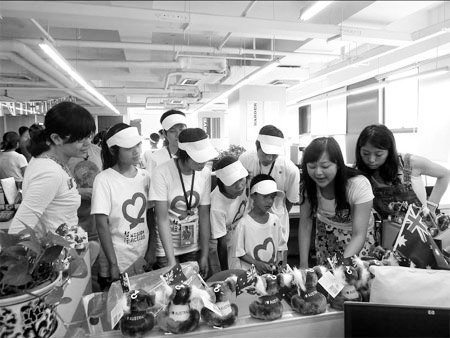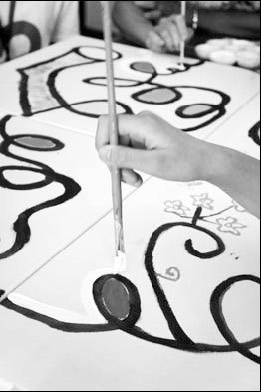Finding hope, escaping clutches of 'that disease'
 |
|
It is the first time most summer camp participants have visited scenic spots, universities and companies. Photos Provided to China Daily |
Li Yujia, 24, sales manager at an automobile 4S store in Beijing, is talking intently to a group of 35 students in a park.
The youngsters listen attentively as Li, not her real name, shares her life story.
Both Li and her listeners are from Henan province and have at least one parent who is living with, or has died of HIV/AIDS.
"I'm telling them how I made it through the years, to encourage them," Li says.
The students are taking part in an annual one-week summer camp sponsored by the Chi Heng Foundation, which was founded in 1998 in Hong Kong and has been funding these students' educations and living expenses since 2002.
The foundation has helped more than 8,000 children from nine provinces, fewer than 1 percent of whom are themselves living with HIV/AIDS.
In the 1990s, tens of thousands of impoverished farmers from Henan made a living by illegally selling blood.
Over the years, many of them were infected with HIV, as the blood was often collected in unsanitary conditions, and needle sharing was rampant.
According to Henan's Department of Health, there were more than 49,000 people living with HIV/AIDS in the province as of the end of 2010.
In 2003, the government began to provide HIV/AIDS patients in rural areas with free medicine. However, most of them had to stay home because of their poor health, leading to a loss in family incomes. The children had to not just deal with poverty but also suffer psychologically from the stigma of HIV/AIDS.
"When I was in primary school, I only knew that my parents were in poor health," says Li, who finished her high school and university education with the foundation's assistance and now helps as a volunteer.
 |
|
Painting helps participants deal with their inner pain. |
"I discovered what their disease was nine years ago but could not open up to anyone for fear of being looked down upon. I felt inferior and dared not speak to anyone," she says.
When she entered a university in Beijing in 2005, she was careful never to mention her hometown, as the village is well known for its HIV/AIDS patients.
She even kept her secret from her boyfriend, who ended their four-year relationship in 2008 after finding out about her family.
"It's difficult for us to find a spouse," she says. "But I'm glad that people's thinking about the disease is improving. My current boyfriend and his family are willing to help my parents.
"For people like us, the only way out is to be educated. Had I had not received an education, I would also have become another married woman with several kids in the countryside, like many of my childhood friends."
Li, who is participating in the camp for the first time as a volunteer, says it offers an opportunity to help broaden the students' vision.
This is the seventh summer camp organized by the foundation. The schedule includes visits to scenic spots, such as the Summer Palace and the National Stadium (Bird's Nest), universities and companies, team-building activities, skating, painting and dancing.
"We should not only ensure they receive educations but also show concern for them. The summer camp gives them hope for the future and shows them what universities and enterprises are like," says To Chung, founder and chairman of the foundation.
For most of the participants, it's their first time to leave their hometowns to come to a city, to travel by train, to experience the subway, skate, dance, study painting and eat at KFC.
"Everything is new to me. The trains I have seen on TV look shabby, but the real trains are well-equipped and fast," says an 18-year-old, who is waiting for her university admission decisions.
Her parents both have AIDS and do farmwork and odd jobs to raise their three children. A loner in school, she has opened up at the camp and is a team leader, who likes to communicate with others. "I used to be afraid of crowds, but now I have the courage to talk to a stranger," she says.
A 15-year-old, whose father died from AIDS several years ago, says: "This is the first time for me to see foreigners. I want to brush up my English so I can communicate with them. They seem so different from us, and I'm curious about them."
For these students, HIV/AIDS is a taboo word and they avoid mentioning it. They instead call it "that disease". Even a passing mention of "that disease" makes them fall silent, and some even shed tears.
"They have witnessed the wasting away of their parents and faced society's discrimination. I was shocked to see their paintings in 2004 that were full of sadness and helplessness," says Lee Wai-fong, art program director of the foundation.
"So I introduced painting lessons in the summer camp, and they learned quickly. Art therapy can really help them resolve their inner pain."
According to Zhang Qiushuang, a staff member of the foundation's Henan office, not everyone is willing to accept help because receiving assistance from the foundation outs their parents as having HIV/AIDS. Some would rather do part-time jobs to get through.
"It is important to protect their privacy. When I visit families living with HIV/AIDS, I usually tell the neighbors I'm a relative. In the camp, too, we use nicknames and ask the participants not to tell outsiders the names of their hometowns," Zhang says.
















